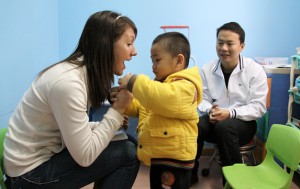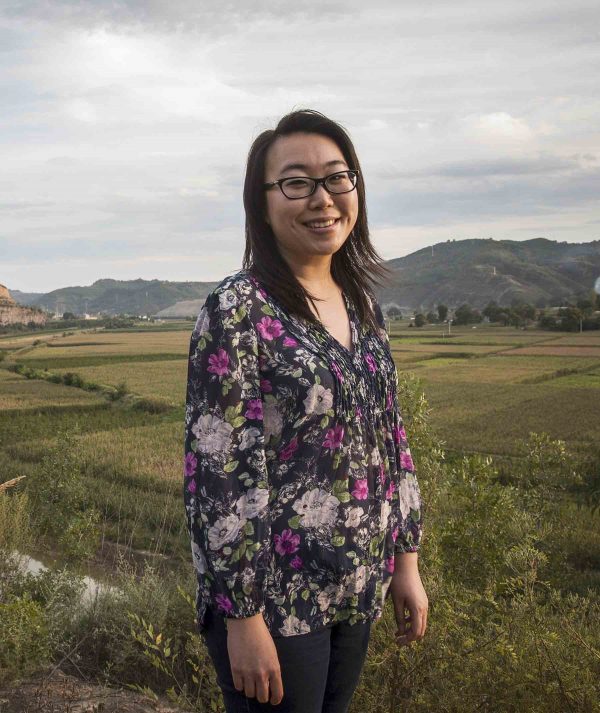
Rachel Reetzke, 2011-2012, China, works with a father and son at the YangAi Parent Club for families of children with developmental disabilities
The impetus for me to begin my Fulbright U.S. Student Program application came during the summer of 2010, as a U.S. Department of State Critical Language Scholar. That summer, I tested my intermediate Mandarin skills by independently organizing a month-long service project at Beijing Stars and Rain Autism Education and Research Center. Through volunteer work at Stars and Rain, I was exposed to a new method of parent training, which provided insight into the diagnosis, and treatment intervention methods for autism spectrum disorders (ASD) in China. Ultimately, the experience revealed to me a dire need for evidence-based practice (EBP) research in the field. I aimed to return to China as a Fulbright student to further explore and develop my place within the networks of doctors, teachers, students, and clinicians serving individuals with ASD in China.
As a Fulbrighter, I became part of an interdisciplinary research team and contributed to the validation of the Chinese Autism Diagnostic Scale (CADS). Currently, there is no autism diagnostic scale based on Chinese linguistic and cultural differences. Therefore, once published, CADS will be a vital tool for current and future diagnosis of ASD in China.
My colleagues and I also learned the role that effective collaborations play in successful service outreach and advocacy projects. Throughout my Fulbright grant, I worked with two local non-profit organizations, YangAi Parent Club and Guangzhou Huiling, as well as the U.S. Consulate in Guangzhou, to establish a network of local and foreign volunteers committed to serving adolescents with developmental disabilities and their families. The Guangzhou Peer Mentorship Pilot program was developed to foster mutually beneficial peer friendships between local Chinese university students and peers living with developmental disabilities. We were able to host three events for ten matched peers during my academic year-long Fulbright grant. Through the development of the Guangzhou Peer Mentorship Pilot Program, we connected with and became a member of the Guangzhou community in a new way, as we worked to bridge the gap between adolescents living with developmental disabilities and their typically developing peers. It was most heartening to observe and experience growth of genuine respect and understanding among these diverse groups of individuals.
I frequently reflect on my time in Guangzhou and draw inspiration from my experiences as a current MA/PhD student in speech-language pathology at the University of Texas at Austin. The relationships that were established with my Fulbright research adviser, as well as with non-profit directors, have unequivocally created a strong foundation to carry out future research and advocacy efforts in Guangzhou.
The best piece of advice I can offer to future Fulbright applicants is to build rapport with potential host country research advisers as soon as possible. All study/research Fulbright grants require applicants to secure a host country affiliation by the time of application. After I submitted my Fulbright application, I sent bi-monthly updates and Skyped with my potential adviser in China to update him on my studies and research progress. Receiving my adviser’s help and support greatly facilitated my transition into my research at the Third Affiliated Hospital of Sun Yat-sen, as well as into “Guangzhou life” in general. Upon arrival in China, I was welcomed with a dinner banquet, and throughout my time in Guangzhou, I was provided with a myriad of resources to achieve my research and service goals.
My Fulbright grant allowed me to not only hone my international research skills at the Third Affiliated Hospital of Sun Yat-sen University, but also provided me with new perspectives on Chinese culture and society. On a personal level, my Fulbright grant challenged me to live more mindfully. Throughout our time living together, my Chinese roommate engrained 别浪费bié làng fèi (do not waste) in my mind, and after returning to the States, I was compelled to continue practicing this lifestyle. For example, I got rid of my car and now only rely on a bicycle and public transportation to get me around Austin. What new habits, perspectives, or goals will you bring home from your Fulbright grant?
Have questions for Rachel? She can be contacted as a Fulbright Alumni Ambassador at RReetzke.AlumniAmbassador@fulbrightmail.org.


No Comments